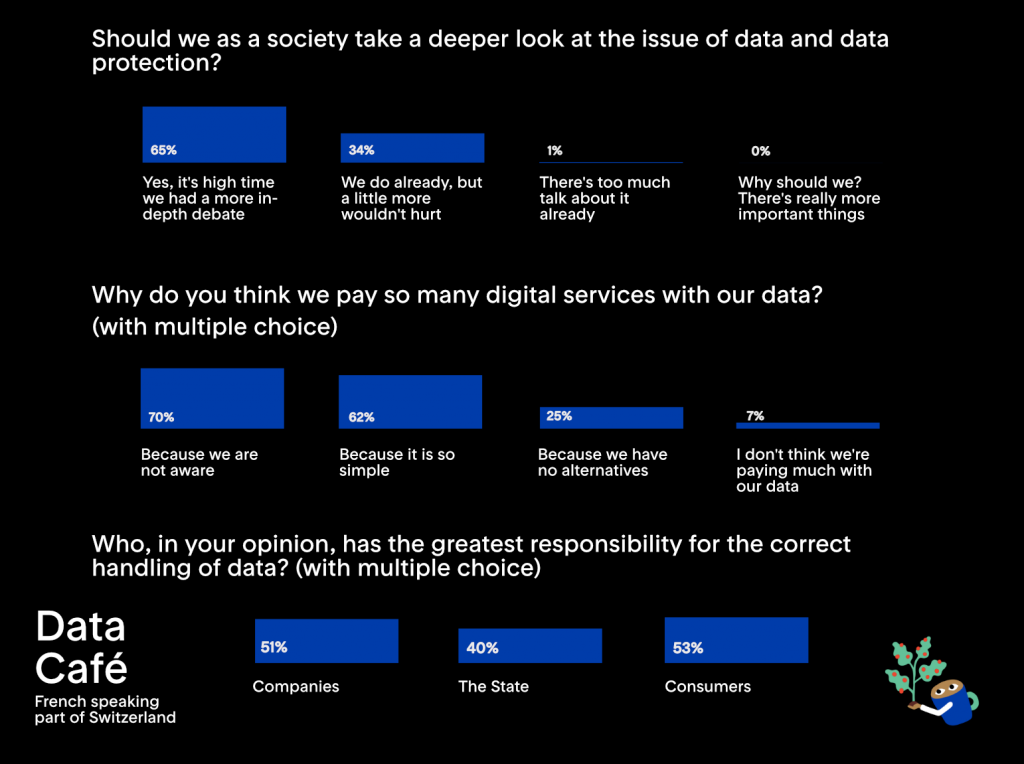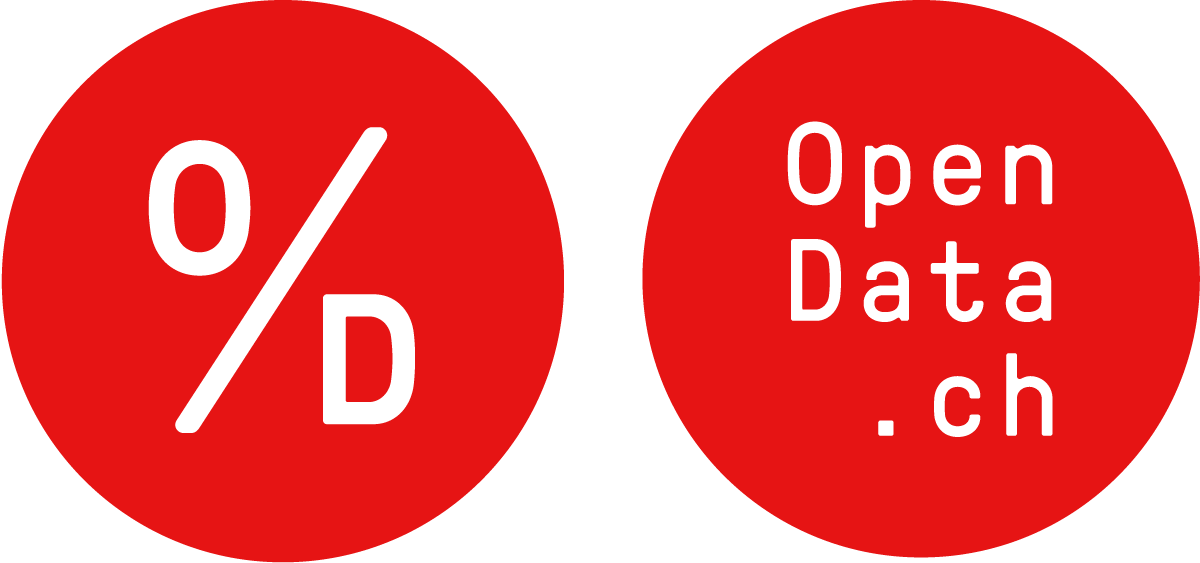Our experience raising data awareness in the Romandie
- Data Café

At 10 locations in the French speaking part of Switzerland, we asked people on the street whether they like to drink a “free” coffee, in exchange for personal data. The question and the free coffee are part of an awareness campaign called Data Café, which promotes a reflective understanding of the value of data in our society. A deal most of us make online every day was brought to the streets -by using Google search, Facebook, Instagram, or WhatsApp, we “pay” for the “free” services with our personal data. Unlike on the Internet, where you can use many services in exchange for personal data, at the Data Café, you get a coffee if you are willing to share your data: first name, last name, gender, e-mail, date of birth, and canton. You can get a feeling for our campaign in this video, but continue reading to learn about our discoveries during the journey through the French speaking part of Switzerland.
Different Locations – different generations – different reactions
The reactions we witnessed during our campaign in the French speaking part of Switzerland were diverse; very diverse. One passerby in Neuchâtel felt offended by our “immoral” offer and threatened to call the police because he felt we were collecting personal data for improper use. He only calmed down once we explained that this whole stunt was part of an awareness campaign. In other places, for example in our campaign at EPFL, many participants didn’t even ask us what we were going to do with their personal data; the coffee was a good enough offer. In those cases, we usually tried to ask some critical questions (“Do you want to know what we will do with your data?”) but some people still weren’t bothered about the deal after that. At some point, we stopped counting the times we heard the sentence “My data is already out there, why should I care?”. This is a point we had already noticed during our campaign in German speaking Switzerland, but we felt that in the “Romandie” we had less critical discussions overall. To read our blogpost about the campaign in German speaking CH, click here.
There may be multiple reasons for this but two main ones must be mentioned. First, we targeted more young people, with two locations of our campaign being on the campus of universities, than during the first (German) part of our campaign. In general, young people seem to be more open to our offer than older people. While the elderly simply refused our offer without any discussion and the young generation often accepted the offer without any discussion, it was the people 40 and 60 years old that were the most critical; sufficiently interested in a coffee but not enough to simply accept the offer without asking some questions first. This raises the question whether we do not need more targeted and more intense awareness raising for data protection in the younger communities.
The second reason for the smaller number of critical discussions we had in the Romandie compared to German speaking Switzerland was that we were often located in institutions that generated trust, such as the ICRC museum, the EPFL or the Graduate Institute Geneva. In these locations, people often answered our questions about their openness for the offer by saying that the institution wouldn’t allow us to be there if it weren’t socially responsible. This indicates that data protection and the behavior of people is contextual and depends heavily on the setting.
The two points described above (more young people and trusted institutions) might also explain why we had a higher average of acceptance of our offer in the Romandie compared to German speaking Switzerland. On average, 35% of Data Café visitors in German speaking Switzerland were willing to pay for their coffee with their personal data while in the Romandie, this average was significantly higher with around 50%. It must be noted that in many locations the average percentage of acceptance was the same as in the German part of our campaign (around 35-40%), for example in the streets of Bienne, Yverdon or Neuchâtel. In more trusted locations (for example the ICRC museum) this average rose to 55% and in the universities (for example the EPFL campus) it even reached 70%.

Critical questions and the transboundary nature of data use
Although generally more open, the people of the Romandie still asked us many interesting and critical questions. Some of them were about the campaign itself. One visitor asked us whether we didn’t contradict ourselves by advocating for a more responsible use of personal data and generally more data protection, all while still collecting the personal data of people. “What you’re doing is like a campaign that says: ‘You shouldn’t drink and drive. Here, have a shot of vodka’”. We explained to him that we were using the data responsibly (for a study of the University of Zürich, fully anonymized), while many “free” online services such as social media don’t do so. The message of our campaign is not to protect personal data at all costs, it is about a responsible use of data and about people being aware how their data is being used by companies. That’s why you “pay” your coffee with personal data, just as you pay for “free” social media with personal data.
Many other questions were asked at our two French-speaking HelpDesk Events. For the HelpDesks, we invited experts to join us at certain campaign locations and answer all the questions of Data Café visitors related to data use and data protection. At both HelpDesks, we had a lawyer specializing in data protection and in one of the two we also had an information security expert. Both HelpDesks took place at Universities (EPFL and Graduate Institute Geneva), because that’s where we felt most awareness raising was needed. What surprised us is that at both HelpDesks, the questions were mostly about the General Data Protection Regulation (GDPR) of the European Union and its applicability in Switzerland. Apparently, many students both from a technical university (EPFL) and a social science university (Graduate Institute Geneva) are well informed about the laws of data protection outside of Switzerland. Students wanted to know what their rights under the GDPR were and how the legal situation looked like in Switzerland. This goes to show that the younger generation is well aware of the transboundary nature of data usage. The technical questions asked during the HelpDesks were mostly about Cookies and why it was important to disable them. The information security expert tried to convince visitors that there were many things related to data protection that were a lot more important than the cookies. “You can disable all the cookies you want but it won’t protect your data if you publish everything about yourself on Facebook.”
If you are further interested in read the blogpost about the german speaking part here. Opendata.ch officially ends the campaign which is enabled by the foundation Mercator CH. However, we can offer you all material to organize a data Café yourself. Find all information here.
